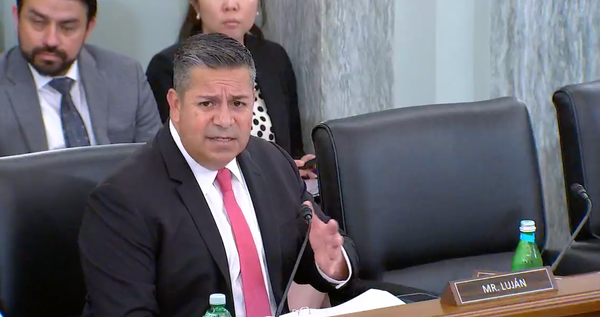Jay Anderson: Is Texas the New Home for Robust Internet Access?
Cost of doing business is driving companies into markets with favorable tax rates and fewer regulations. Here’s how they’re prioritizing.

It is hard to ignore how the COVID-19 pandemic has impacted our lives––namely, how we work and live. Many people emerged from the pandemic with a request to employers: Continue to allow flexible work arrangements. Thanks to digital transformations across industries, Americans are embracing flexible work arrangements, and they want more of it.
In fact, according to McKinsey’s American Opportunity Survey, 58 percent of U.S. job holders—equivalent to 92 million people—report that their employers are still offering the option to work from home for all or part of the week. The survey also showed that when given the opportunity to work flexibly, 87 percent of workers embrace it.
Because of the shift toward remote work, people are relocating to cities that better suit their needs. New data by Upwork reports that 2.4 percent of Americans–– about 5 million people––have relocated since 2020. And, 9.3 percent of Americans––around 20 million people––are planning to relocate.
Companies also are considering relocation. According to FiberLight’s 2022 Business Relocation Expansion Survey, 70 percent of IT and corporate decision makers say they are considering relocating their business or adding more locations within the next 3-5 years. Executives cited market saturation and availability, followed by the expense of doing business in major metropolitan areas, and expanding their operations, as factors driving the change.
Notably, of these respondents, 78 percent said they are considering relocating their business to Texas. Why Texas? Texas offers several advantages including a lower cost of living, favorable tax rates, and fewer regulations. Ranking high on the list of Texas cities decision makers are considering for relocation include: Dallas / Ft. Worth, Austin, and San Antonio, in that order. Decision makers also are considering a host of more rural Texas markets including El Paso, Arlington, Corpus Christi, Plano, Lubbock, Irving, Laredo, Frisco, Garland, Brownsville, Amarillo, McKinney, and others.
Yet businesses will need faster, more robust connectivity in order to execute their business strategies.
Executives surveyed said that they are planning, primarily, for Hybrid and Cloud infrastructure models. Their biggest priorities for connectivity upgrades include 1) Speed / Low Latency, 2) Security, and Diverse Connections.
Executives also said that they are prioritizing the following local infrastructure needs:
Data center access (29% of respondents): What today’s data center requires
The new data center requires an infrastructure that can provide rapid, secure data transmission through reliable, scalable, high-capacity bandwidth that meets the processing demands of next-generation technologies like blockchain systems. Many blockchain data centers are cropping up in rural areas of Texas; however, sourcing reliable connectivity to the internet can be challenging.
Public sector (22% of respondents): A broadband for all advocate for rural America
Public sector teams are critically important to finding solutions that deliver next-generation technology to underserved rural areas. By raising awareness of the need for broadband for all, connecting communities to funds and resources, and establishing partnerships, public sector teams can help municipalities, schools, and businesses access the networks that will help them to grow and scale into the future.
Cloud migration (20% of respondents): Key factors to consider
For enterprises choosing to migrate operations and workloads to the cloud, robust and secure fiber connectivity within a mission-critical colocation facility is a must. Choosing the right data center with the best connection to the cloud is half the battle. Organizations must also ensure there is fiber network infrastructure that’s scalable and reliable providing interconnectivity between their locations and their chosen data centers.
Dedicated internet access (15% of respondents): The path to increased uptime, speed, and reliability
Enterprises of all sizes can benefit from choosing Dedicated Internet Access (DIA)––a private or fully dedicated connection between the internet and the customer. Enterprises, data centers, government institutions, and many more businesses today require a fully dedicated connection allowing large amounts of data to be transferred at faster speeds in order to keep pace with their business needs.
Dark fiber (12% of respondents): A cost effective network strategy to future-proof businesses
Dark fiber holds a lot of potential to rejuvenate the capabilities of businesses across many key vertical industries, including healthcare, finance, education, and beyond. This network strategy effectively future-proofs businesses, empowering them with the ability to cost effectively meet the growing needs of their end-users with bolstered bandwidth, reduced latency, and more.
Post-pandemic relocations are igniting digital transformation and highlighting the core infrastructure requirements to support business expansion. It will be exciting to see how rural areas around our country will begin to flourish as a result.
Jay Anderson is chief technology officer of FiberLight, a fiber infrastructure provider with more than 20 years of experience building and operating mission-critical, high-bandwidth networks. As CTO, he is responsible for evolving FiberLight’s infrastructure and technical capabilities to ensure the company can respond quickly to the changing digital ecosystem needs of its customers. This piece is exclusive to Broadband Breakfast.
Broadband Breakfast accepts commentary from informed observers of the broadband scene. Please send pieces to commentary@breakfast.media. The views reflected in Expert Opinion pieces do not necessarily reflect the views of Broadband Breakfast and Breakfast Media LLC.









